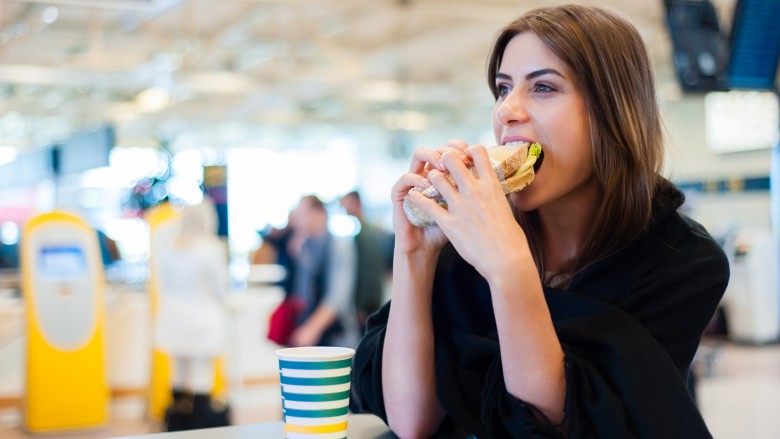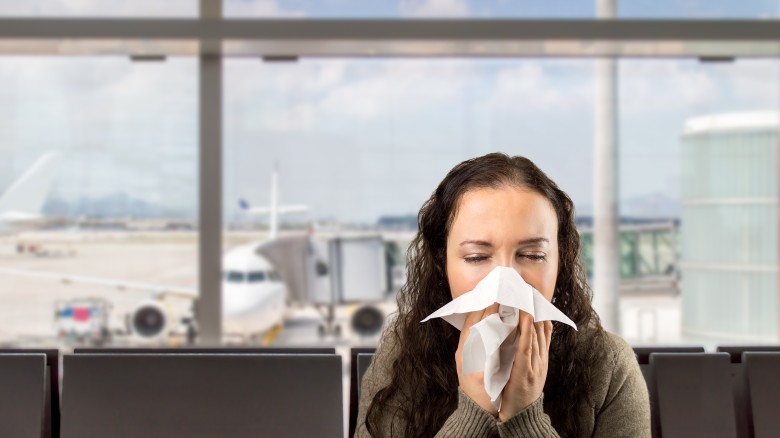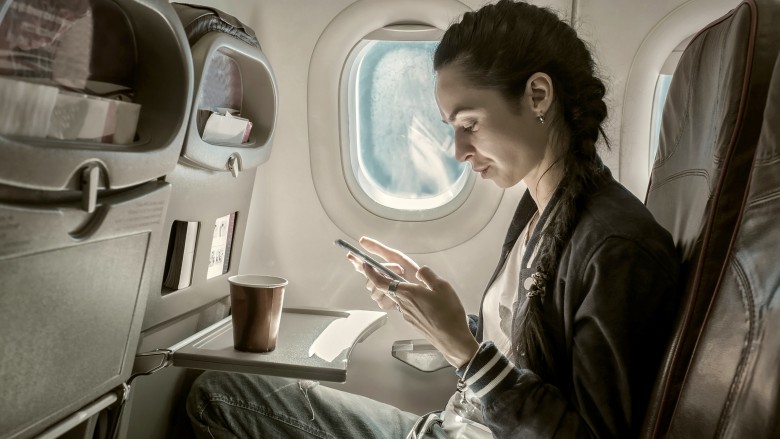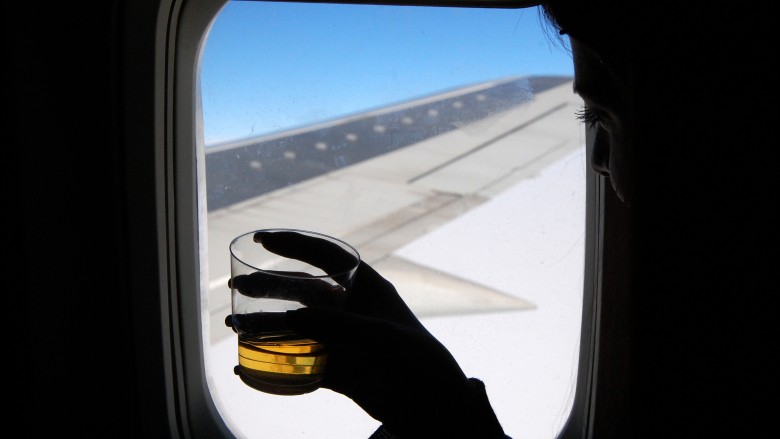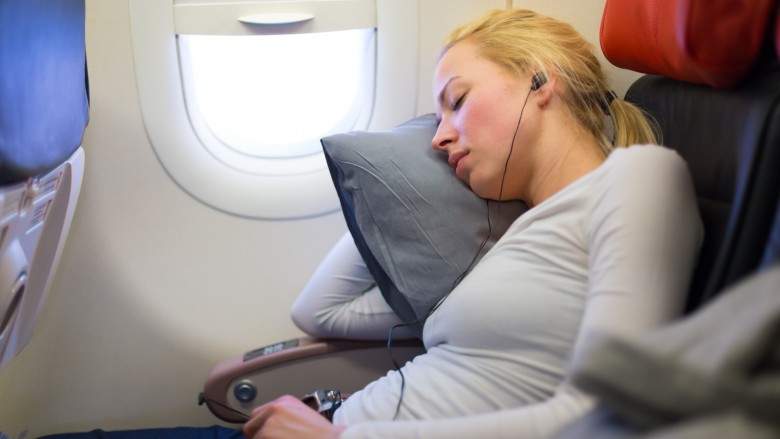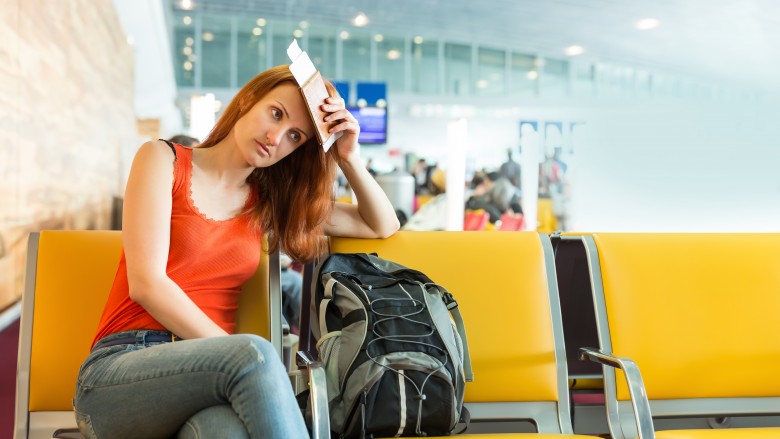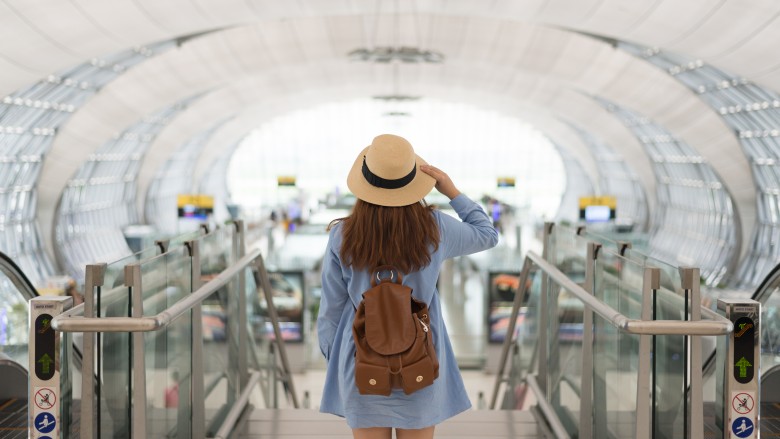Unhealthy Mistakes You Make When You Fly
Everyone loves a vacation. The plane ride that usually happens on the way to said vacation, however, isn't always as fun. From the long airport security lines to the array of funky smells that hit your nose within seconds of boarding, I'd be lying if I said flying was one of my favorite parts about traveling. And since I almost always end up with a terrible cold any time I come remotely close to an airport, I often wonder if maybe, just maybe, there's a way to be more health-conscious about flying. My usual routine of getting lost in an audiobook while curled up in my window seat, waiting for the plane to land, just doesn't seem to be cutting it.
That's why I took to the experts to find out what unhealthy habits most of us are guilty of when flying. Here's what they had to say.
Skipping out on water
I'll be the first to admit that I'm not always good about drinking water, especially when I'm traveling. In fact, one of the only parts of an airplane ride I look forward to is ordering a Ginger Ale because it is one of the few times I drink anything resembling soda. But as refreshing as this little ritual has been for me, it isn't the healthiest of choices according to Toby Amidor, MS, RD nutrition expert and author of The Greek Yogurt Kitchen: More Than 130 Delicious, Healthy Recipes For Every Meal of the Day. "It is of utmost importance to hydrate during (and after) the flight," she told me in an interview. "Flying can easily dehydrate you because the humidity in the cabin is much lower than usual."
Besides seriously drying out your skin and making you feel fatigued, letting your body become dehydrated can also make you susceptible to some less-than-pleasant health issues. "Harsh cabin air often dries up the mucous membranes in the ears, nose, and mouth, which can leave you more susceptible to infection," NYC cardiovascular surgeon Dr. David Greuner explained to me via email. "Make sure you're drinking enough water to offset the dry conditions by sipping until your urine becomes light in color."
Relying on airport food
From oversized pastries to candy bars and soda, airports are a land mine of unhealthy food options that can wreak havoc on our bodies, making us feel even more lethargic and cranky while in the air. "When flying folks usually opt for the non-perishable carbs like chips, crackers, muffins, and other such dry foods," Amidor told me. "This can easily get someone off track of their healthy eating plan and often can lead to overeating on days that you're flying. Together with not drinking enough water, it can really throw your whole body off where you just don't feel well." Instead, she suggests scoping out the airport food court for things like fruits, vegetables, dairy, and lean protein.
Dr. Greuner even suggests taking your planning a step further by pre-packing your own food. "I'll typically bring hummus packs and grain crackers, vegetables that won't perish easily, homemade trail mix, and a protein bar to hold me over until my next meal," he said.
Not only are these overall healthier choices, but they'll also help you avoid that run-down and sluggish feeling that so often comes from indulging in too many processed foods.
Ignoring germs
If you're anything like me, you can practically guarantee you'll catch a cold within days of stepping off an airplane. In fact, recent research conducted by CompareTravelInsurance.com.au claims that we're nearly 100 times more likely to catch a cold during a flight, thanks to being cramped in close quarters in a virtually humidity-free zone (conditions where cold and flu viruses thrive).
To avoid catching these germs, Dr. Greuner suggests packing plenty of antibacterial wipes or gel. "The second you get on the flight, consider wiping the tray table, seats, and buttons around your seat to kill any lingering germs left behind from other passengers," he said.
He also suggests bringing along vitamin C to boost your immune system during the flight. "I'll often take vitamin C a few days before I plan on traveling to prepare my system for any germs it might come into contact with in the air," he said.
Dressing uncomfortably
Sure those super skinny jeans are cute for a night out with friends, but you probably want to skip wearing them to the airport — especially since our bodies can become bloated and dehydrated while in the air. No one wants to deal with a too-tight waistband on top of a bulky and uncomfortable seatbelt.
"Make sure to wear loose, nonrestrictive clothing that allows for easy, comfortable movement," Dr. Greuner said. "I also recommend knee- or thigh-high compression socks that provide plenty of external support."
Staying seated the entire flight
Okay, so getting up to use the airplane bathroom isn't exactly tempting. But even if you do try to avoid those tiny lavatories like the plague, Dr. Shawn Tsuda, a board-certified general surgeon at miVIP Surgery Centers, says it's important to get up out of your seat periodically throughout the duration of your flight. "Sitting for long periods can predispose you to blood clots in your legs," he explained to me. "These can be potentially deadly."
Dr. Greuner agreed, saying, "No matter what the mode of transportation, sitting motionless for long periods may put some travelers at an increased risk for Deep Vein Thrombosis, a blood disorder resulting from the formation of a blood clot (thrombus) inside a deep vein of the leg, commonly located in the calf or thigh." And with 2 million DVT cases diagnosed in the United States each year, Dr. Greuner notes it is the third leading cardiovascular disease behind heart attack and stroke.
"Your blood can't circulate efficiently without a little help from your muscles," added naturopathic physician Dr. Taryn Forrelli of OLLY Vitamins. "If you don't want to walk off the plane with swollen ankles, you need to engage your muscles by moving your body."
Loading up on booze
Vacations are often a cause for celebration, so an in-flight toast to an upcoming birthday, graduation, or bachelorette party may seem harmless. However, Dr. Tsuda warns us this might not be the healthiest decision. "Because of the lower level of oxygen in your blood while flying, you may seem more drunk in the air than you would on the ground after consuming the same amount of alcohol," he said. "The air in an aircraft is also very dry, and coupled with the diuretic effect of drinking alcohol, you may become dehydrated much faster than you would on the ground."
Dr. Forrelli agreed, saying, "An occasional drink is fine, but make sure not to go overboard as drinking too much alcohol can compromise your immune system. It takes roughly an hour to break down each drink you have, so if you have three drinks it will take about three hours."
Falling asleep in a bad position
While catching up on sleep could be a productive way to kill time while in the air, dozing off in certain positions can put major stress on your body. "Not bracing your neck during a flight is a common mistake," Carolyn Dean, MD, ND a sleep and nutrition expert, and author of The Magnesium Miracle told me via email.
"Brace your neck with a curved travel pillow, you will sleep better and avoid neck ache and a misaligned neck, which will result in pain, decreased circulation, and poor sleep," she said. "I always take a flight pillow with me."
Letting your body clock get out of whack
Sleeping during a nighttime flight can be a good idea, but you should avoid taking unnecessary naps, Dr. Dean noted. "If you have to wake up extra early for a morning flight, a quick nap on the plane can do wonders, but if you are simply napping to kill time, it can backfire, especially if you are crossing time zones as it may make it even more difficult to fall asleep at night," she said. "Best to stick with your normal sleep/wake schedule when traveling for less than three to four days."
Forgetting to relax
Airports can be stressful. From lost luggage to delayed flights, there is plenty to worry about en route to your next destination, making it easy to feel anxious. "Relax," Dr. Tsuda reminds us. "Travel can be stressful, but stress weakens immunity and is bad for your health," he said. "Plan ahead so that you have more than enough time to make your flight and also have your tickets and ID well organized and easily accessible."
If traveling puts you a little on edge, Dr. Dean suggests taking a magnesium supplement before your fly. "Magnesium is known as the anti-stress, anti-anxiety mineral and is a natural sleep aid," Numerous studies have shown its effectiveness in lowering anxiety and reducing stress levels, as well as helping with deeper more restful sleep." Dr. Dean also notes that magnesium can be effective in helping relax tense neck, back and leg muscles.
A well-prepared traveler is a healthy traveler
From avoiding alcohol to stretching to loading up on healthy snacks, there are plenty of ways you can make sure to stay healthy during your travels. "Traveling can be difficult on the body, but with a bit of planning and thoughtful choices, you can stay at the top of your game, even before/during/after long-hauls," said Marra St. Clair, holistic health coach and co-founder of Project Juice.
Among her favorite healthy travel tips: "Be sure to drink plenty of water before your travel day. In the days leading up to travel, adding raw turmeric in your diet can help avoid headaches when flying, with its powerful anti-inflammatory properties," she said. "Once you arrive at your destination, if possible, add in green juices that contain celery, which naturally helps restore electrolyte balance. Also incorporate sparkling water for electrolyte replacement."
After all, feeling healthy will only make your travels that much sweeter. Bon Voyage!


